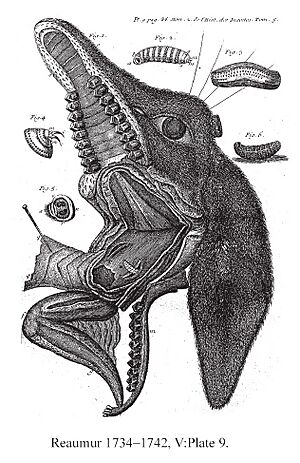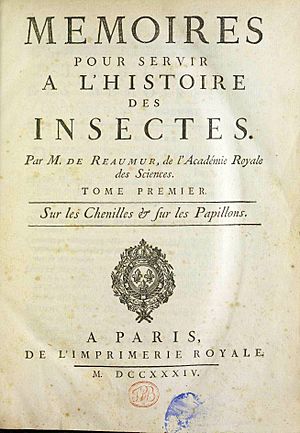René Antoine Ferchault de Réaumur facts for kids
Quick facts for kids
Réaumur
|
|
|---|---|
 |
|
| Born | 28 February 1683 |
| Died | 17 October 1757 (aged 74) |
| Nationality | French |
| Known for | Temperature scale named for him |
| Scientific career | |
| Fields | Entomology |
René Antoine Ferchault de Réaumur (French: [ʁeomyʁ]; 28 February 1683 – 17 October 1757) was a French scientist. He was very interested in many different fields. He is best known for his work studying insects. He also invented a temperature scale, which is named the Réaumur scale after him.
Contents
Life and Early Discoveries
Réaumur was born in La Rochelle, France, into an important family. He studied philosophy in Poitiers and later civil law and mathematics in Bourges. In 1703, he moved to Paris to continue studying mathematics and physics.
When he was only 24, in 1708, he became a member of the French Academy of Sciences. For almost 50 years after that, he published many scientific papers. He started by focusing on mathematics, especially geometry.
Helping French Industry
In 1710, Réaumur became the main editor of a big government project. This project aimed to create new factories in France and improve old ones. He made important discoveries about iron and steel. He found a way to make tinning (coating iron with tin) that is still used today. He also figured out the differences between iron and steel. He showed that cast iron has the most carbon, steel has less, and wrought iron has the least.
Réaumur was given money for his discoveries, but he asked for it to go to the Academy of Sciences instead. He wanted the money to help with more experiments to improve industries.
The Réaumur Temperature Scale
In 1731, Réaumur became interested in meteorology, which is the study of weather. He invented a thermometer scale that is named after him: the Réaumur scale. On this scale, the freezing point of water is 0 degrees. The boiling point of water is 80 degrees.
Later Life and Legacy
Réaumur loved to live a quiet life in the countryside. He lived at his home in Saint-Julien-du-Terroux. He died there in 1757 after falling from a horse.
He left all his writings and his collections of natural history to the Academy of Sciences. His work covered many areas of science.
Studying Nature and Animals
Réaumur was very interested in natural history. His friends sometimes called him "the Pliny of the 18th century."
Insect Studies
One of his biggest and most famous works is a six-volume book called Mémoires pour servir à l'histoire des insectes. This book describes the look, habits, and places where many insects live. It is known for its careful and accurate observations.
He studied how wasps make paper from wood fibers. This observation later helped people develop new ways to make paper from wood pulp. He also studied how insects grow and how their populations change with temperature.
Réaumur also proved that corals are actually animals, not plants. This was an important discovery at the time.
Other Animal Discoveries
He studied how Echinodermata (like starfish) move. He also showed that these animals could really regrow lost body parts. He is even considered one of the founders of ethology, which is the scientific study of animal behavior.
Réaumur also looked into whether spiders could be used to make silk. He developed ways to keep birds and eggs fresh. He also created a system for artificial incubation, which means hatching eggs without a mother bird. He made important observations about how different birds digest their food.
Selected Works

- Réaumur, R.-A. F. de. 1722. L'art de convertir le fer forgé en acier, et l'art d'adoucir le fer fondu, ou de faire des ouvrages de fer fondu aussi finis que le fer forgé. Paris, France.
- Réaumur, R.-A. F. de. 1734–1742. Mémoires pour servir à l'histoire des insectes. Six volumes. Académie Royale des Sciences, Paris, France.
- Réaumur, R.-A. F. de. 1749. Art de faire éclorre et d'élever en tout saison des oiseaux Domestiques de toutes espèces. Two volumes. Imprimerie royale, Paris, France.
Images for kids
See also
 In Spanish: René Antoine Ferchault de Réaumur para niños
In Spanish: René Antoine Ferchault de Réaumur para niños
 | Valerie Thomas |
 | Frederick McKinley Jones |
 | George Edward Alcorn Jr. |
 | Thomas Mensah |




